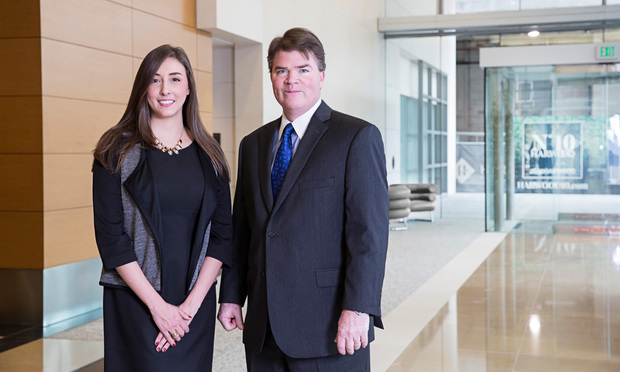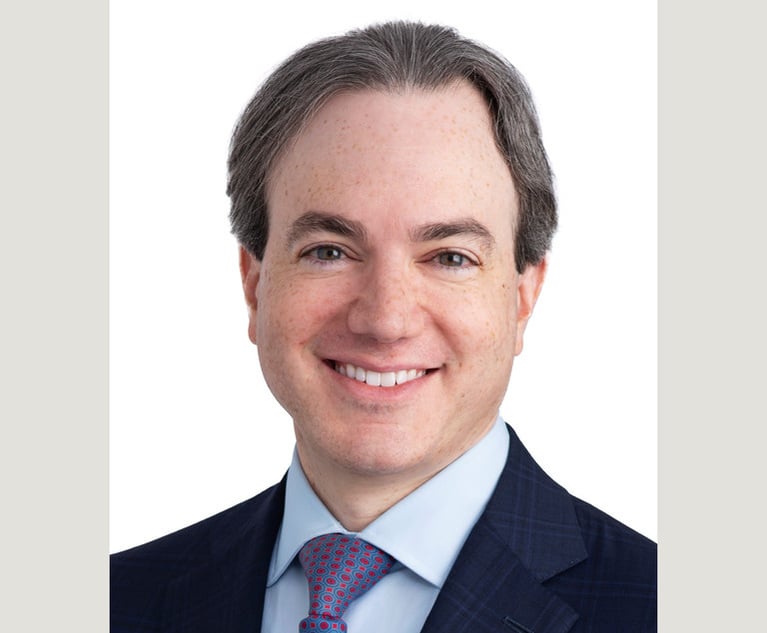Litigator of the Week: Loud Dallas Lawyer Wins Acquittal of Fellow Attorney by Shutting Up
David Finn is the kind of trial lawyer most people want when they're facing 30 years in prison. He's loud, is not above pounding tables, and will do just about anything to have the last word before a jury.
January 04, 2018 at 07:52 PM
4 minute read
 Tiffany Talamantez and David Finn.
Tiffany Talamantez and David Finn. David Finn is the kind of trial lawyer most people want when they're facing 30 years in prison. He's loud, is not above pounding tables, and will do just about anything to have the last word before a jury.
But the aggressive Dallas attorney took a different approach to win a recent acquittal for a fellow lawyer accused of bank fraud—he just shut up.
Finn's client, James B. Wright, is a Mississippi real estate attorney who was indicted last year in the Eastern District of Texas on charges of conspiring with two businessman to make false statements to a Dallas bank in the course of closing numerous real estate transactions.
During a weeklong, document-heavy trial, a federal prosecutor alleged Wright conspired with two businessmen to provide false closing statements to obtain federally backed mortgage loans from PrimeLending.
Specifically, the government claimed Wright, a title attorney, worked with the businessmen to locate buyers for property for a fee and submitted separate closing statements—one to the bank that did not disclose the fee and another to the buyers and sellers that did.
Finn used his full-volume, demonstrative style to argue that Wright didn't defraud anyone and that it's not unusual to have two separate closing statements when the buyers and seller of property are from different states.
“David is kind of loud,” Wright said. “The acoustics were horrible in that courtroom, but the jury had no problem hearing David.”
But when it came time to give the crucial closing argument in the case, Finn decided to turn his volume down completely by handing that job over to his co-counsel Tiffany Talamantez, a young Dallas lawyer with four years of experience.
Finn said he feared his abrasive style as lead attorney didn't go over well with some of the female jurors.
“I figured we'd be able to communicate better if it wasn't high octane Finn all the time. People respond better to different voices,” Finn said. “I was self-aware enough to know I may have rubbed some of the jurors the wrong way. And I thought at that particular point in time it might have paid dividends.”
“I was thinking now some of the female jurors will think maybe he's not such an ass,'' Finn explained. “Giving up the microphone and the last word—that that guy would give up the chance to make the closing argument—I think the prosecution was shocked.''
Talamantez, who cross-examined two witnesses in the trial, was also shocked Finn gave her the chance to make her first-ever closing argument before a federal jury.
“I was passionate,” Talamantez said of her closing argument. “But I think what made me able to get up there, and the nerve to do it was I really believed in what we were saying. I had a genuineness that came through, but I wasn't raising my voice or pounding my fist or pointing at anybody. I truly believed that he was not guilty.”
The tactic worked because the jury indeed found Wright not guilty on Dec. 22. His co-defendant, Brett Immel of Chicago, was also found not guilty. Another co-defendant, Daniel C. Bomar, pleaded guilty last year and awaits sentencing.
The jury's verdict was remarkable because it was the first full acquittal before U.S. District Judge Amos Mazzant of the Eastern District of Texas in his three years on the bench.
Chris Eason, an Eastern District assistant U.S. attorney who prosecuted the case, did not return a call for comment.
Wright was so pleased with Finn's representation that he wrote a commendation letter to the Dallas Bar Association praising his lawyer's performance.
“Having someone that believes in you and who leaves no stone unturned in your defense is awe-inspiring to watch. You all can be very proud that David Finn is a member of your association and he is someone that I will be grateful to for the rest of my life,” Wright wrote in the letter.
“I've been a lawyer from 27 years. I have been around,” Wright said of the trial. “But I have never seen someone in the courtroom doing the things he did. It was like watching a TV show. If I wasn't involved in it, I'd have probably enjoyed it more.”
This content has been archived. It is available through our partners, LexisNexis® and Bloomberg Law.
To view this content, please continue to their sites.
Not a Lexis Subscriber?
Subscribe Now
Not a Bloomberg Law Subscriber?
Subscribe Now
NOT FOR REPRINT
© 2025 ALM Global, LLC, All Rights Reserved. Request academic re-use from www.copyright.com. All other uses, submit a request to [email protected]. For more information visit Asset & Logo Licensing.
You Might Like
View All
Houston-Based Law Firm Overcomes Defamation Suit for Website Warning
3 minute read

Houston Law Firm Files $250K Breach of Contract Suit Against 2 Former Lawyers
3 minute read
‘What’s Different About Jarkesy?’ 5th Circuit Weighs if FCC Forfeiture Order Is Constitutional
Trending Stories
- 1DC Lawsuits Seek to Prevent Mass Firings and Public Naming of FBI Agents
- 2Growth of California Firms Exceeded Expectations, Survey of Managing Partners Says
- 3Blank Rome Adds Life Sciences Trio From Reed Smith
- 4Divided State Supreme Court Clears the Way for Child Sexual Abuse Cases Against Church, Schools
- 5From Hospital Bed to Legal Insights: Lessons in Life, Law, and Lawyering
Who Got The Work
J. Brugh Lower of Gibbons has entered an appearance for industrial equipment supplier Devco Corporation in a pending trademark infringement lawsuit. The suit, accusing the defendant of selling knock-off Graco products, was filed Dec. 18 in New Jersey District Court by Rivkin Radler on behalf of Graco Inc. and Graco Minnesota. The case, assigned to U.S. District Judge Zahid N. Quraishi, is 3:24-cv-11294, Graco Inc. et al v. Devco Corporation.
Who Got The Work
Rebecca Maller-Stein and Kent A. Yalowitz of Arnold & Porter Kaye Scholer have entered their appearances for Hanaco Venture Capital and its executives, Lior Prosor and David Frankel, in a pending securities lawsuit. The action, filed on Dec. 24 in New York Southern District Court by Zell, Aron & Co. on behalf of Goldeneye Advisors, accuses the defendants of negligently and fraudulently managing the plaintiff's $1 million investment. The case, assigned to U.S. District Judge Vernon S. Broderick, is 1:24-cv-09918, Goldeneye Advisors, LLC v. Hanaco Venture Capital, Ltd. et al.
Who Got The Work
Attorneys from A&O Shearman has stepped in as defense counsel for Toronto-Dominion Bank and other defendants in a pending securities class action. The suit, filed Dec. 11 in New York Southern District Court by Bleichmar Fonti & Auld, accuses the defendants of concealing the bank's 'pervasive' deficiencies in regards to its compliance with the Bank Secrecy Act and the quality of its anti-money laundering controls. The case, assigned to U.S. District Judge Arun Subramanian, is 1:24-cv-09445, Gonzalez v. The Toronto-Dominion Bank et al.
Who Got The Work
Crown Castle International, a Pennsylvania company providing shared communications infrastructure, has turned to Luke D. Wolf of Gordon Rees Scully Mansukhani to fend off a pending breach-of-contract lawsuit. The court action, filed Nov. 25 in Michigan Eastern District Court by Hooper Hathaway PC on behalf of The Town Residences LLC, accuses Crown Castle of failing to transfer approximately $30,000 in utility payments from T-Mobile in breach of a roof-top lease and assignment agreement. The case, assigned to U.S. District Judge Susan K. Declercq, is 2:24-cv-13131, The Town Residences LLC v. T-Mobile US, Inc. et al.
Who Got The Work
Wilfred P. Coronato and Daniel M. Schwartz of McCarter & English have stepped in as defense counsel to Electrolux Home Products Inc. in a pending product liability lawsuit. The court action, filed Nov. 26 in New York Eastern District Court by Poulos Lopiccolo PC and Nagel Rice LLP on behalf of David Stern, alleges that the defendant's refrigerators’ drawers and shelving repeatedly break and fall apart within months after purchase. The case, assigned to U.S. District Judge Joan M. Azrack, is 2:24-cv-08204, Stern v. Electrolux Home Products, Inc.
Featured Firms
Law Offices of Gary Martin Hays & Associates, P.C.
(470) 294-1674
Law Offices of Mark E. Salomone
(857) 444-6468
Smith & Hassler
(713) 739-1250






